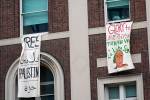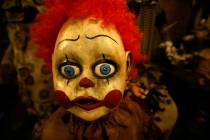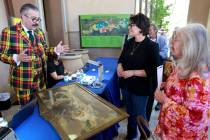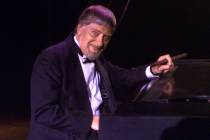‘Million Dollar Quartet’ chronicles Sun Records jam session

Elvis is everywhere. After all, this is Vegas.
But long before Presley put the "Viva" in Las Vegas, he joined the "Million Dollar Quartet."
The time: Dec. 4, 1956.
The place: Sun Records in Memphis, Tenn.
There, at Presley’s former record label, the pelvis-swiveling sensation joined Sun stars Johnny Cash and Carl Perkins – along with a piano-pumping newcomer named Jerry Lee Lewis – for what turned out to be a jam session of historic proportions.
To say nothing of the hit stage musical "Million Dollar Quartet," which begins an eight-performance run Tuesday at The Smith Center’s Reynolds Hall.
The Tony-winning New York production closes later this month, following more than 900 performances.
But without that New York showcase, the musical "never would have gotten the first-class tour that’s now touching down in the West," points out co-writer Colin Escott .
Escott, a veteran pop music historian, wrote the book – literally – on Sun Records.
In "Good Rockin’ Tonight: Sun Records and the Birth of Rock ‘N’ Roll," Escott recounts the events that led up to what the show’s musical director, Chuck Mead, calls "the Mount Rushmore of rock ‘n’ roll."
And when Floyd Mutrux – director of the 1978 movie "American Hot Wax," inspired by pioneer disc jockey Alan Freed’s career – read Escott’s book, "he called me and said it would be a helluva good stage show," Escott recalls.
Thus was born a whole-lotta-shakin’ musical, with Escott and Mutrux collaborating on a Tony-nominated script; Eric Schaeffer (co-founder of the Tony Award-winning Signature Theatre) directed both the Broadway and touring productions.
Despite the show’s straight-from-the-jukebox score, "Million Dollar Quartet" was never conceived as the kind of "jukebox musical" (think "Mamma Mia!") that’s become a Broadway staple.
"Usually this kind of thing would be done to a (prerecorded) track," Escott says.
But he and Mutrux wanted to convey "that kind of edgy rock ‘n’ roll feel" – the same kind of energy that marked "American Hot Wax."
To that end, the "Million Dollar Quartet’s" members – Lee Ferris (of the Los Angeles band Freddy and Francine) as Perkins, British-born Martin Kaye as Lewis, Derek Keeling (of TV’s "Grease: You’re the One That I Want") as Cash and Cody Slaughter (Elvis Presley Enterprises’ Ultimate Elvis Tribute Artist of 2011) as Presley – not only sing but play their own instruments as well.
"They make mistakes sometimes," Escott acknowledges, but that only adds to the "jam session feel."
Creating that impromptu atmosphere meant that Mead – a musician himself and a former member of the alt-country band BR549 – had to tutor the actors, who "went to rockabilly school" under his supervision.
"The first week" of rehearsals, "we just had band practice," Mead explains, noting that the performers "worked pretty hard to learn those kinds of licks."
The "band practice" in turn enabled the performers to deliver "Million Dollar Quartet’s" greatest-hits musical numbers, from Perkins’ "Blue Suede Shoes" and Presley’s "Hound Dog" to Lewis’ "Great Balls of Fire" and Cash’s "I Walk the Line."
In the process, the actors also learned to convey "the spirit of the music," Mead says, "that these are real guys who are just makin’ it up as they went along."
What they were making up, of course, turned out to be the foundation for not just a musical but a cultural revolution.
That revolution didn’t happen in a day, of course.
Taking advantage of dramatic license, the creators of "Million Dollar Quartet" "telescoped 18 months of Sun Records history in one night," Escott notes.
And "the guy who carries the narrative" of the show, he points out, doesn’t sing a note.
That would be Sun Records founder Sam Phillips (Christopher Ryan Grant), whom Mead calls "The Puppetmaster."
Or, as Escott describes him: "the best set of ears, ever, in rock ‘n’ roll."
After all, Phillips was the one who heard Presley’s first recordings and didn’t "shoo him out into the street," Escott notes. He heard Cash, and heard something besides the "boom-chicka-boom" rhythms he favored. And after only 10 seconds of Lewis’ demo, Phillips decreed, " ‘Sign him,’ " Escott points out.
As an independent label owner, Phillips "was the guy who had his ears to the ground" – and the guy who wound up selling Presley’s contract to a major label, RCA, so he could pump the $40,000 he received into his struggling studio.
"Million Dollar Quartet" also touches on other dramatic undercurrents at Sun Records.
Cash, who was unhappy at the label, wondered "where he’d be going next – and what would get him there," Escott explains. (His eventual destination: another major record label, Columbia.) Perkins, meanwhile, wanted to find a follow-up to "Blue Suede Shoes," which had raced up the charts alongside Presley’s "Heartbreak Hotel."
Perkins "though was not just Elvis’ contemporary, but his equal," according to Escott.
Lewis also had his eye on Presley’s crown, believing that "within the next few months, he would eclipse Elvis."
As for Elvis himself, he was home in Memphis for the holidays after setting the entertainment world ablaze in ’56.
Everywhere but Las Vegas, that is; after bombing as Shecky Greene’s opening act at the Last Frontier, the future showroom king tells his fellow quartet members, " ‘I swear I’ll never play Vegas again,’ " Escott quotes Presley. ("I guess it didn’t help that the kids who liked him weren’t old enough to get into the casino," Escott adds.)
Audiences are all too familiar with the tabloid aspects of Presley’s, Lewis’ and Cash’s lives – the latter two chronicled in the movies "Great Balls of Fire" and "Walk the Line," respectively.
But "what they don’t know is what these guys were like" as "kind of icons-in-training," Escott observes. Seeing the "Million Dollar Quartet" in action "really lets people feel like they’re a fly on the wall."
Contact reporter Carol Cling at ccling@reviewjournal.com or 702-383-0272.
Preview"Million Dollar Quartet"
8 p.m. Tuesday throogh June 17, 2 p.m. June 16-17
Reynolds Hall, The Smith Center for the Performing Arts, 361 Symphony Park Ave.
$27-$141 (749-2000; thesmithcenter.com)


















